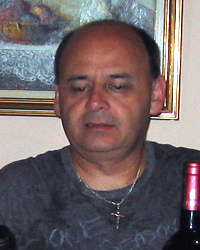The Meglenite Vlasi are a small, distinct ethnolinguistic group living in Greece and Northern Macedonia. They are believed to have descended from Romanized local populations, who adopted Roman culture and language during the Roman occupation of Greece. They are part of the broader Vlach family, a term referring to Romanians and Romance-speaking people living in the Balkans. Meglenites, however, have distinct cultural and linguistic differences.Historically, Vlachs were known as nomadic livestock herders. Over time, the Meglenites settled in what is now Northern Greece and Macedonia. As other Vlachs continued to migrate, the Meglenites turned to farming and began to develop their own cultural distinctions.Their Megleno-Romanian language is critically endangered, with only a few fluent speakers remaining. Many of the Meglenite Vlasi people today have assimilated into Greek culture. However, there has been a renewed interest in keeping the Meglenite cultural identity among younger generations. They live in Greece and North Macedonia.
Many Meglenite people have assimilated into Greek or Macedonian culture. However, some still live agrarian lifestyles in small villages. They keep traditional holidays and festivals and have unique wedding ceremonies. During these times, the Meglenite culture really shines through, as they wear colorful traditional clothing and play traditional music.
The majority of Meglenite Vlasi are Eastern Orthodox Christians. Orthodoxy is intertwined with their national and ethnic identity, as it is with the Greeks. Despite this, there is a small minority of Muslim communities that converted during the Ottoman Empire.
Strong cultural and religious ties to Orthodoxy present a barrier to understanding the gospel. They believe they are Christian by birthright, even if they have little understanding of what they believe. There is a great need for relational evangelism to help bring the Meglenite people to a saving faith in the person of Jesus Christ.There is also the possibility of a language barrier among the older generations who may only speak Megleno-Romanian.
Pray for the Meglenite Vlasi people to come to a saving faith in Christ and to experience a personal relationship with the Lord.Pray for a sustainable move of God in the Meglenite communities and for a revival of biblically healthy churches.Pray for laborers for the harvest, who will devote themselves to learning the Meglenites unique language and Culture.Pray for the development of a Megleno Romanian Bible and Christian resources.
Scripture Prayers for the Meglenite, Vlasi in North Macedonia.
Eberhard, David M. “Romanian, Megleno Language (RUQ) – L1 & L2 Speakers, Status, Map, Endangered Level & Official Use | Ethnologue Free.” Ethnologue, 2025, www.ethnologue.com/language/ruq/.Friedman, Victor A.. "Vlach". Encyclopedia Britannica, 14 Jul. 2023, https://www.britannica.com/topic/Vlach. Accessed 23 September 2025.Kahl, Thede, and Andreea Pascaru. “Meglen Vlach.” Austrian Academy of Sciences, 2021, www.oeaw.ac.at/vlach/collections/meglen-vlach?utm_source=chatgpt.com.Kahl, Thede. “The islamisation of the meglen vlachs (Megleno-Romanians): The Village of Nânti (Nótia) and the ‘nântinets' in present-day Turkey.” Nationalities Papers, vol. 34, no. 1, Mar. 2006, pp. 71–90, https://doi.org/10.1080/00905990500504871.Megleno-Romanians, www.hellenicaworld.com/Greece/History/en/MeglenoRomanians.html?utm_source=chatgpt.com. Accessed 24 Sept. 2025.“Vlachs in Greece - Minority Rights Group.” Minority Rights, 2018, minorityrights.org/communities/vlachs/.?îrcomnicu, Emil. “Megleno-Romanians. Spatial Distribution, number, and identity features.” Europäisches Journal Für Minderheitenfragen, vol. 17, no. 1–2, 2024, pp. 120–135, https://doi.org/10.35998/ejm-2024-0008.
| Profile Source: Joshua Project |










